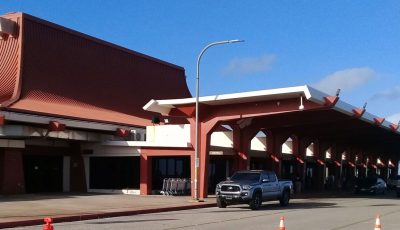‘Lower wharfage fee not intended to benefit company’

Commonwealth Ports Authority board member Pete Reyes chairs the board’s seaport facilities committee. (Ferdie de la Torre)
Emergency regulations that reduced the wharfage rate for prefabricated modular units by half is intended to help the people of Saipan and Tinian and not to benefit just one company.
This was emphasized by Commonwealth Ports Authority board member Pete Reyes, who chairs the board’s seaport facilities committee.
Wharfage refers to the fee charged by the terminal on passage of a cargo or merchandize through it.
Reyes said the emergency regulations that the board adopted last Nov. 27 creates a new tariff schedule for different kinds of items brought to the CNMI in response to Super Typhoon Yutu’s devastation.
“Many homes are destroyed and one way to rebuild at a very reasonable cost is to change this wharfage, the tariff to allow for our people to bring in modular units,” said Reyes Monday after the CPA board’s committees’ meeting.
The emergency change slashed the wharfage fee on prefabricated modular units by 50 percent.
The issue was discussed again during Monday’s committee meeting as there was confusion whether it was approved or not by the board.
Those with homes that were destroyed by the typhoon can bring in these materials that are already prefabricated such as restroom, kitchen, and other sections that will just be placed in the structure’s foundation.
Reyes said the price of using these prefabricated modular units is lower by half than building a concrete house.
“The benefit of this is there is no need for additional requirement of CW [workers] because you don’t need to build a unit that requires the division of rooms and staff like that. All you need to do is plug in the wires and pipes and the electricity and have a home,” he said.
Reyes said the CNMI does not have any wharfage designation for this kind of containerized modular homes because it was never anticipated to bring in these materials. Hammering out the wharfage regulation for this material would encourage its importation, he said.
“This is a new thing in the market,” said Reyes, adding that they needed to come up with something attractive so that it can be brought in.
“There is no heavy reliance on carpenters, construction workers and there is no construction waste that is going to burden our dumpsites,” he pointed out.
Reyes said that changing the tariff schedule will not benefit just one company. It is open to any company that is willing to look into this and bring it in and offer this kind of service, he said.
At the seaport facilities committee meeting last July 27, Tom Liu, of Saipan Globe, announced that the company will be bringing in customized metal modular containers to build a nine-story hotel and two-story villas beside the fire station in San Roque.
According to the minutes of the meeting, Liu said the modular units will be pre-assembled and can withstand winds of 175 mile per hour.
Liu said that based on an $11.40 wharfage fee, it will cost $1,600 to ship in each unit. With the 50 percent discount, it will cost just $800 per unit. The shipment weighs 22 tons.
He said their structural engineer in Guam took a lot of time in designing this and the building requirements were approved by the Department of Public Works.
Saipan Globe’s plan is to bring in 600 units.
When asked about the unit’s multiplier effects, Liu said that, using the modular units, hotels could be built faster, there will be job opportunities, little waste, and each unit could be used for anything—a home, office, and others.
CPA board director Kimberlyn King-Hinds, who agreed that the amount of waste would be lessened by using these modular units, opposed reducing the wharfage rate of $11.40.
At that same July 27 committee meeting, CPA board director Barrie C. Toves moved to amend the Terminal Tariff Regulations to add a subsection which would state “wharfage for prefabricated modular units which contain completely assembled structures and shall not contain cargo, shall be: Per Revenue Ton $5.75.”
Board director Thomas Villagomez seconded Toves’ motion. No one opposed so the motion was passed for board’s action at the board meeting.
After the board’s approval, the amendment is to be published in the Commonwealth Register for comments.
At the Nov. 3 board meeting, by a 5-1 vote, the board approved the emergency regulation. It was only Villagomez who voted “no.” Villagomez did not explain why he was against it.
Those in favor were Reyes, King-Hinds, Roman Mendiola Tudela Sr., Barrie Toves, and Joe Diaz.
The wharfage issue was discussed again last Monday as to whether the emergency regulations was approved by the board or just at the committee level.
Reyes said Villagomez is entitled to his own opinion and that he believes the director is just concerned that this was brought as an emergency regulation as opposed to a regular regulation.
Reyes said Villagomez and Tudela argued at last Monday’s meeting that this was only approved by the committee and it did not go to the board.
Reyes said the emergency regulation was approved in the committee and then the board approved it in a special board meeting.
With the board’s approval there was no need to go through the Commonwealth Register, Reyes said.
However, he pointed out, the regular regulation that addresses the same thing is going to be approved by the board at the next meeting.
Reyes disclosed that there are three companies that are already availing of this wharfage tariff.
“It’s open and most especially on Tinian because the cost of building a home on Tinian is more expensive than it costs to build a home on Saipan,” he said.
Reyes said the cost of all the materials that were used for homes and the cost of shipping it to Tinian have created a burden for many residents on Tinian and Rota.
“This is something that is readily available at a very affordable price,” he said.
As to a concern that CPA is losing thousands of dollars in revenue for the initial shipment of a company after the emergency regulations took effect, Reyes disagreed.
“How can you lose something that you don’t bring in? They were estimating on a hypothetical import. So, if you talk about hypothetical income you don’t take that income to the bank and deposit it,” he said.
“When you create a demand for something like this, then the supplies will come, along with the demand and that’s how you create an economy,” he said.
Reyes said some people think this is being done for just one company. “It’s not. It’s being done for our people. The concern here is our folks, our people, our residents of the CNMI,” Reyes said.
At Monday’s meeting, Tudela said he specifically asked about the board’s approval of the tariff.
Tudela recalls mentioning that he supports the intent. “Up to now I support the intent,” he said.
Tudela said, however, it was approved during a committee level, but he does not recall that the board actually approved it.
“The process is where I got confused. I was hoping for this issue to come to the board for final approval,” he said.
King-Hinds said she asked to expedite the regulations after Yutu’s devastation. “We have gone through the process with the announcement and we adopted it,” said King-Hinds.
Tudela said he does not have a problem with the regulations but it’s like “we’re jumping.” “It just it did not go through the process,” he added.
From what he recalls, CPA in-house counsel Joseph Hallahan said the regulations went to the board after the committee meeting.
King-Hinds said all the emergency regulations’ intent was to move the modular units forward in light of Super Typhoon Yutu.
“There are other companies now shipping in the modular units. I know that for a fact. It’s not just one company. It may seem that way but it’s not one company,” King-Hinds said.
King-Hinds and Reyes said there are three companies shipping in modular units, which are designed for homes and even private offices.
Tudela said he thinks it’s high time to move forward.
Reyes said the wharfage issue has been discussed for a long time and then Yutu came and they need to address the housing problem to help the affected people.
“So, we acted to address that. It’s properly approved,” Reyes pointed out.



























